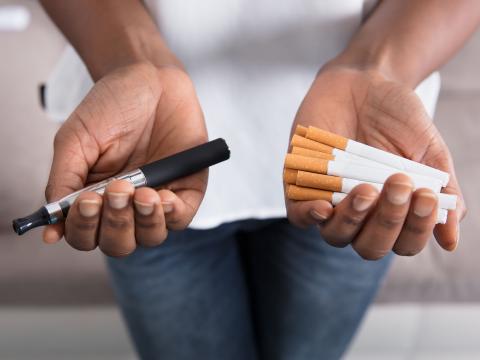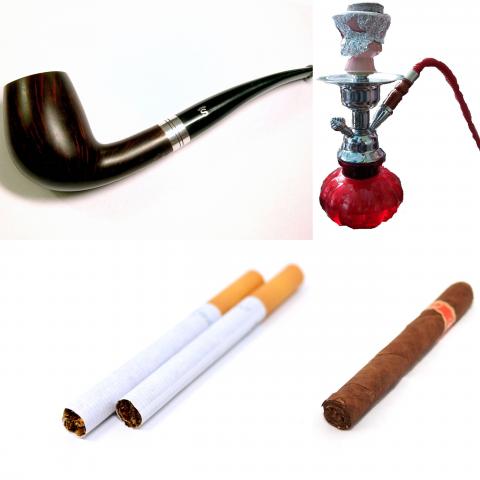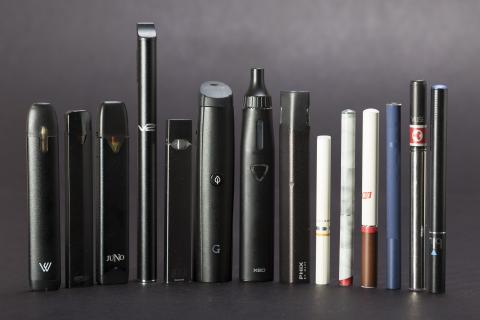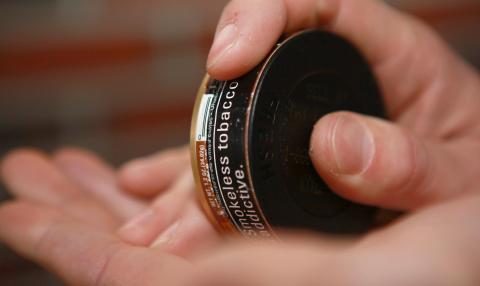Health & Wellness provides services, education, and support to help you make informed and value-driven choices around nicotine.
Tobacco, Smoke and Nicotine-Free Policy
Thinking about quitting?
Support & Resources for Quitting
Working with students who could use more information?
Request an educational program

Learn about Nicotine
The products listed below contain nicotine, an addictive stimulant derived from the tobacco plant. The properties of nicotine, the methods through which it is ingested, as well as behaviors and thinking associated with use can lead to physical and/or psychological dependence.

Combustible Tobacco: Cigarettes, Cigars, Hookah, Kreteks, Cigarillos
The basic components of most combustible tobacco products are tobacco, chemical additives, a filter, and paper wrapping. Cigarettes are responsible for the vast majority of all tobacco-related disease and death in the United States.

Electronic Nicotine Delivery Systems (ENDS): E-cigarettes, Juuls, Other Vapes
ENDS are considered tobacco products because most contain nicotine, which is derived from tobacco. ENDS produce an aerosol by heating a liquid that usually contains nicotine, flavorings, and other chemicals to make the aerosol. Users inhale the aerosol into their lungs. Bystanders can also breathe in this aerosol when the user exhales it into the air. ENDS devices can be used to inhale THC via cartridges and have been identified in causing serious lung injury and deaths.

Smokeless Tobacco: Chew, Loose Snus, Dip, Snuff
Smokeless tobacco is a tobacco product that is used by means other than smoking. Their use involves chewing, sniffing, or placing the product between gum and the cheek or lip. Smokeless tobacco products are produced in various forms, such as chewing tobacco, snuff, snus, and dissolvable tobacco products. Chewing tobacco and other smokeless tobacco products are often promoted as safer than cigarettes. That's because they aren't linked to lung cancer. But these products are not harmless, especially during the critical period of brain development between ages twelve and twenty-five.
People use nicotine for many different reasons. Here are a few:
- Nicotine is stimulating
- Nicotine is perceived as harmless
- Nicotine reduces your appetite
- Nicotine is a way to relax or take a break
- Nicotine is a way to talk to new people and connect with others
- Nicotine use has become connected to a routine (e.g., after eating breakfast, when leaving class, while studying, at parties when hanging out with friends)
- Nicotine is used to manage cravings and withdrawal symptoms
- Nicotine is perceived as a socially acceptable and/or as a condition to belong to one’s peer group
Nicotine use is influenced by many factors including:
- family history of use
- culture
- age of onset (i.e., starting in teenage years leads to higher rates of addiction later in life)
- social norms
- emotions / mood state
- social media
- targeted marketing strategies to vulnerable populations
There are many health risks associated with the substance nicotine, as well as specific risks associated with the methods used to ingest it (see below). Some problems develop immediately, and others develop over time.
Oral / Smokeless Tobacco Use:
ENDS Use: Risks to Youth and Young Adults
- Nicotine harms the developing brain, specifically the parts that control attention, learning, mood, and impulse control.
- Use of vape products increases risk of future dependence, not only to nicotine but to other substances.
- Aerosol is in e-cigarettes, not harmless water vapor. Exposure to aerosol harms the user, those around them, and is comprised of harmful substances that damage the lungs.
- Other Risks include long-term lung damage and injury from defective products.
- Juul carries its own risks due to exposure to especially high levels of nicotine.
- Heated Tobacco Products (HTP) contain harmful and potentially harmful ingredients.
Nicotine products are known to:
- cause illness to humans and animals exposed to second and third hand smoke and vape-aerosol
- second-hand smoke
- third-hand smoke
- pollute air, water, and earth
- poison farm laborers that harvest the plant (many of whom are youth and children)
- contribute to deforestation
- impact finances due to both product costs and medical expenses
UNH is Tobacco, Smoke and Nicotine (TSN) Free!
UNH has joined over 2,400 colleges and universities across the nation in adopting a 100% Tobacco, Smoke, and Nicotine (TSN) Free policy as of January 1, 2022.
For TSN education, information, and resources to support cessation, read on!
New Hampshire Clean Indoor Air Ordinances
- Smoking is prohibited in all public schools, childcare facilities, restaurants and bars (allowed in cigar shops and allows for an economic hardship waiver).
- Smoking restrictions are required in government workplaces, private workplaces, casinos/gaming establishments, retail stores and recreational/cultural facilities.
- E-cigarettes (juuls, vapes) are included in the state’s definition of smoking.
- For more information check out BreatheNH
Tobacco21 Federal Law
- The minimum age of sale for tobacco products is 21.
- The law penalizes retailers for selling tobacco products to youth, not those attempting to purchase, although many states and cities retain purchase, use, and possession (PUP) laws.
- The law does not require that states pass laws to raise their sales age to 21, but it does require states to demonstrate that their retailers are complying with the law. If not, the state eventually risks losing some portion of their federal substance abuse grant funding.
Access Services
Individual Counseling/Education
We offer individual sessions with Educator/Counselor, Nancy Bushinsky, MSW, LICSW.
Meet one-on-one with an ANOD Educator/Counselor to:
- Learn more about how nicotine use affects your well-being
- Have a non-judgmental conversation about your use
- Learn strategies to support your wellness goals regarding nicotine use and/or nicotine cessation
- Learn how to talk to or support friends you may be concerned about
- Learn about community resources
- Learn more about substance use at UNH
Appointments
- All visits are confidential
- This service is available to all UNH students and is offered at no cost for full-time students who have paid their tuition/fees.
- Make an appointment online or by calling (603) 862-3823.
Medical Care
Our clinicians can evaluate your physical health, help you understand how nicotine is impacting your body, and discuss medical options to decrease withdrawal symptoms commonly experienced during the quit process. Make an appointment online or by calling (603) 862-2856.
More Resources
- Truth Initiative
- American Non-Smokers Rights (ANR) Foundation
- U.S. Center for Disease Control and Prevention (CDC)
- American Cancer Society
- U.S. Food and Drug Administration (FDA)
- American Non-Smokers Rights Foundation
- UCSF Smoking Cessation Leadership Center
Dive Deeper
- Know the Risks: E-cigarettes & Young People
- Outbreak of Lung Injury Associated with E-Cigarette Use, or Vaping (U.S. Centers for Disease Control and Prevention (CDC)
- American Cancer Society Warns About Risks of Vaping for Youth (American Cancer Society)
- Vaporizers, E-Cigarettes, and other Electronic Nicotine Delivery Systems (ENDS) (U.S. Food & Drug Administration (FDA)